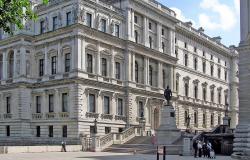Money, Ministries, Motives, and Meh: How Might the Election Change UK Development Policy?

Andy Sumner scopes the potential future of the UK's international development policy.
The UK election is at hand. The campaign has been dominated by questions of what might change in the UK (or not). But there’s been relatively little attention on overseas and specifically, foreign and development policy. What are the main political parties pledging?
Here, I examine each of the main parties’ manifestos and assesses how UK development policies and priorities could shift, focusing on money, ministries and motives as well as the different visions and priorities.
First, let’s talk about money
The Conservatives and Labour have recommitted to a return to spending the UN aid target of 0.7 percent of gross national income (GNI) as soon as UK finances “allow.” And there’s the rub. Over the parliamentary term of five years, the tests for this will almost certainly not be met, nor would they have been in any of the last 20 years). Therefore, not surprisingly, manifestos are vague on the timeline. The current spend is 0.58 percent of GNI (£15.4 billion a year), which is above the OECD DAC average. However, it’s notable this number includes a £2 billion boost, allocated by the Chancellor to help cover elevated refugee costs.
There is also not much said about the fact that over half of all UK bilateral aid is now spent in the UK. Yep, you did read that right. Over £4 billion, or almost 30 percent of the total UK aid budget is being spent on refugee housing costs. With small boat crossings rising again, and no clear plan to reduce costs (Labour dropped plans to allow asylum applicants to work after six months in line with many other countries approach), this will be an ongoing problem.
Although in-donor refugee costs can be included as ODA it is not really in the spirit of “aid”. If we discount this spend, more than an extra £7 billion per year is needed to get to 0.7 percent of GNI. That would be made up of £4.3 billion replacing budget currently being used up by refugee costs, plus an extra £3.2 billion to get to 0.7.
If the refugee costs continue to be included the UK is—surprisingly and tantalisingly—only £3.2 billion away from getting back to 0.7. That sounds almost plausible.
Each of the Liberal Democrats, Plaid Cymru and the Scottish National Party have pledged 0.7 percent of GNI on aid spending in their manifestos, with the Greens pledging one percent. If any of these parties find themselves in a coalition, there is potential for a rise. Conversely, Reform have pledged to halve the aid budget.
If UK ODA spend isn’t increased what would be the implications? It could mean efforts to ensure the spending that is available for ODA is refocussed on the poorest countries or conflict-affected places, but it could also mean more attention to policy coherence (arguably a much tougher thing to do, e.g., debt rules in the city of London, tax havens and trade policy).
Second, ministries
Will the UK resurrect the former Department for International Development in a DFID2.0?
Many have commented on the demise of DFID, or merger (read takeover) with the Foreign Office in 2020 (which apparently took place without any planning ahead of time). The Independent Commission on Aid Impact, for example, noted that the merger had led to a dominant foreign policy culture, and a loss of DFID expertise, a decline in transparency, less focus on evidence, a reduced culture of internal challenge, and the risk of a large-scale loss of institutional memory. Staff engagement tanked following the merger and is only just now recovering.
The Conservatives would continue with the Foreign, Commonwealth and Development Office (FCDO) as it is. Only the Liberal Democrats commit to re-establishing an independent DFID 2.0. Labour say they will “strengthen” development work within the FCDO. What does that mean? It’s not clear from the manifesto. It could imply a more radical revamped ministry, as some have proposed along the lines of a ministry for international affairs. That would certainly link to the more geopolitical era the world currently sits in. Alternatively, it could mean that the FCDO simply has a stronger development angle within it, such as a commitment to cross-government coherence and ownership. Alternatively, it could go a step further and establish an independent development agency with policy and implementation, but within the FCDO. This approach would establish a degree of freedom from foreign policy. It’s not clear which Labour is edging towards.
The Conservatives seem to have committed to the international development minister continuing to attend cabinet, as is currently the case (in fact Andrew Mitchell also has the title of Deputy Foreign Secretary). Labour is almost in the same place on this. Though it’s not included in their manifesto, this letter from Shadow minister Lisa Nandy, released after the manifesto was published, states that “a Minister in Cabinet will lead on development within the FCDO.”
Third, motives (and thus, vision)
How might the motives or drivers and thus the vision of UK development policy change? There does seem to be some clear water between parties in the sense that the Conservatives want to add a UK-first proviso that all aid spending would meet a new “national interest test”, though they haven’t said what this may entail. There is also a pledge to a new “Soft Power Strategy”, again this isn’t defined, but presumably these policies are to appeal to an aid-sceptical audience—as Reform have by saying they want to cut UK aid by half.
The Conservatives also say they would push for debt relief, build on the recent FCDO White Paper, and—–at odds with the conditions around national interest laid out above—focus on poverty and the UN Sustainable Development Goals (SDGs), supporting marginalized groups, gender equality, and global health and contributing to climate finance. And support the BBC World Service.
Labour adopt not the UK-first rhetoric but instead place emphasis on global leadership through the multilateral system and respect, partnership and common interests with the Global South. This could be significant, as the new European Commission leans right, populist sentiments in many countries continue to grow and, in the US, too, if Trump is elected in November.
Soft power also gets a mention though with reference to cultural institutions (Sounds like the BBC again). Policy priorities similarly include promoting economic development, addressing debt, reducing conflict, ensuring climate finance, and gender equality. All the usual ones. In fact, reading the manifestos there is almost a sense that there is a template for the manifesto section on development policy. It goes something like this: say something about recommitting to 0.7 but don’t say when; say something on poverty, SDGs, gender equality, climate and conflict; and finish by saying it’ll all be effective, transparent and value-for-money.
In terms of global leadership, the Liberal Democrats actually go further, saying they will restore the UK reputation as a development “superpower” and that gender equality will be at the “heart” of foreign policy (though not much on what that means).
So, in conclusion, meh?
Will anything change by that much? Outside the sanitized world of manifestos (the ultimate “ming vase”?), many ideas are bubbling (you’d really hope so at least) but who knows for sure what will come to fruition.
But what can we be sure of? First, money is tight. So, one might expect more about genuine policy, not just spending money. In fact, if Labour does win, as the polls currently suggest, there are many questions about what their existing UK policies mean for international cooperation. For example, Labour’s new wealth fund and energy company will presumably include investments outside the UK, and potentially in the Global South. Or Labour’s other flagship policies such as the five “missions” for the UK—might they somehow impact international cooperation? How might Labour’s Green Prosperity Plan and a planned Supply Chain Commission, for instance, be incorporated into UK development policy?
Second, we may get a better idea of the next Government’s approach with the wide set of multilateral events the new government will face. Almost immediately after the UK election there’s the UN High Level Political Forum on the UN’s Sustainable Development Goals. One thing that may come up is the need to extend the SDG timeline beyond 2030 given current trends. The alternative would be to agree on a new post-2030 agenda, but that seems tough in the time frame and the state of multilateralism. The SDGs were negotiated and agreed by all countries so extension, in light of the pandemic, seems politically plausible. Shortly after, the UK will host the European Political Community (maybe a security pact extended with a development dimension anyone?). September is the UN Summit of the Future. Then in November, there’s a need for a new climate finance goal at COP29 (that will in turn motivate emissions reductions plans in developing countries due by next February). December is the replenishment of arguably one of the most significant pots of development funds (at least in terms of concessional lending), the World Bank’s IDA. And into 2025, there’s the big Financing for Development conference in June.
In sum, plenty of opportunity to take up that multilateral leadership flame. In the meantime, if the only real clarity is that ODA money won’t rise anytime soon given domestic pressures, this could mean that more attention is paid to policy rather than spending, and what the UK does in the world and the UK’s broader relationship with countries in the Global South (not just the 30-40 countries where ODA really matters and that account for about half of global poverty). In most countries in the Global South, ODA no longer really matters that much. So, less focus on the precise ODA spend might be a good thing (as long as it doesn’t fall further). And—more importantly—in the event of a realignment of the right of UK politics, less focus on aid spending and more focus on policy, its coherence and global leadership might be politically astute too.
Many thanks to Ian Mitchell and Maya Verber for comments and inputs on this blog.
Andy Sumner is Professor of International Development at King’s College London and President of the European Association of Development Research and Training Institutes (EADI).
This first appeared on the CGD's blog.
Disclaimer: CGD blog posts reflect the views of the authors, drawing on prior research and experience in their areas of expertise. CGD is a nonpartisan, independent organization and does not take institutional positions.
Image: By Adrian Pingstone - Public Domain


